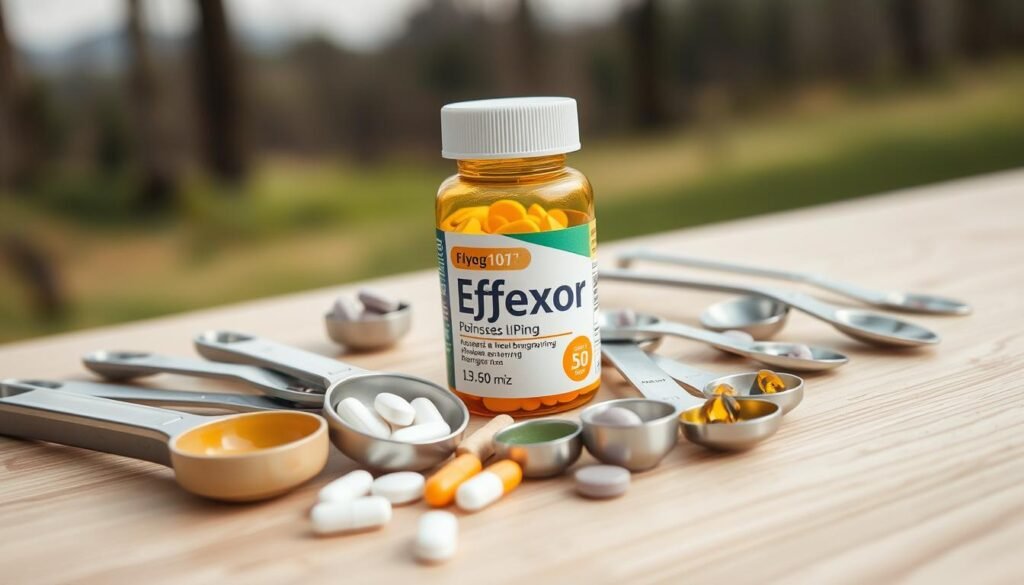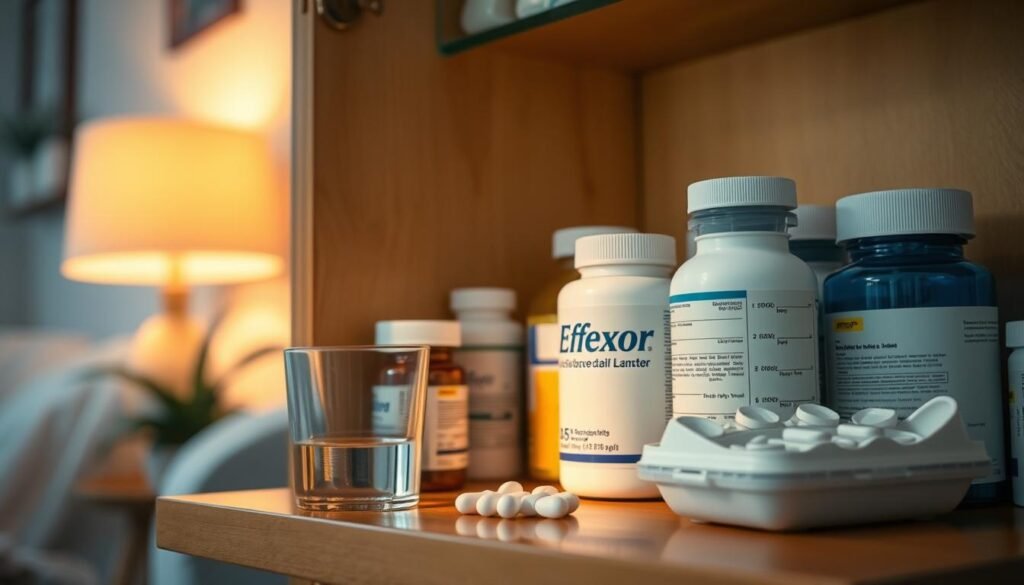Did you know nearly 31.1% of U.S. adults face an anxiety disorder at some point? This fact underlines the need for effective treatments like Effexor, or venlafaxine. It’s designed to aid in controlling anxiety disorders. Finding the correct Effexor dosage is key to giving patients the best relief from their symptoms. Effexor, as a serotonin-norepinephrine reuptake inhibitor (SNRI), is a well-studied option for anxiety management. This guide will focus on why getting the right Effexor XR dosage matters for a more balanced life.
Key Takeaways
- Effexor XR is available in three strengths: 37.5 mg, 75 mg, and 150 mg.
- The recommended starting dosage for generalized anxiety disorder is between 37.5–75 mg daily.
- Maximum dosages for most conditions treated with Effexor XR do not exceed 225 mg per day.
- Long-term treatment often requires dosage adjustments based on individual health factors.
- Regular intake at the same time each day enhances effectiveness and minimizes missed doses.
- Gradual dosage reduction is essential when discontinuing Effexor to avoid withdrawal symptoms.
Understanding Effexor and Its Role in Anxiety Treatment
Effexor, also known as venlafaxine, helps manage anxiety disorders. It’s a type of medication called an SNRI. SNRIs increase important brain chemicals related to mood. This is essential for people fighting anxiety.
Effexor tackles various forms of anxiety, including generalized anxiety and panic disorders. Over 30% of adults in the US have experienced anxiety. For many, Effexor has reduced their symptoms and helped them feel more stable.
Besides anxiety, Effexor can help with depression, OCD, and PTSD. It can also improve sleep, which aids in overall health.
Doctors must carefully prescribe Effexor, considering each person’s specific needs. They look at potential side effects and drug interactions to ensure safety. Effexor can take a few weeks to start working. So, ongoing check-ups with the doctor are important.
What is Effexor XR?
Effexor XR is a special kind of venlafaxine. It slowly releases medicine into your body during the day. This means you only have to take it once a day. Effexor XR comes in different doses: 37.5 mg, 75 mg, and 150 mg, to meet different needs.
Effexor XR works by increasing serotonin and norepinephrine in the brain. This helps treat anxiety and depression. It’s effective for various conditions like anxiety disorders and major depressive disorder. Effexor XR is approved by the FDA, making it a trusted choice.
It’s vital to follow your doctor’s advice on dosage. Monitoring your reaction to venlafaxine is crucial. Side effects might happen, or it could affect other medicines you’re taking. For more on dosages, check out this guide.
Effexor Dosage for Managing Anxiety
It’s important to know the right Effexor dosage for anxiety. Different anxiety disorders need different starting doses. Below, we share the recommended dosages for various conditions. This makes sure patients get what’s best for them.
Recommended Starting Dosages
Doctors usually start with a low Effexor dose. Then, they adjust it if necessary. The starting dosages are typically:
- 37.5 mg for panic disorder
- 75 mg for social anxiety disorder
- 37.5–75 mg for generalized anxiety disorder
Effexor XR means dosages can be tweaked to suit each person. Regular check-ups help find the right dose.
Dosage for Generalized Anxiety Disorder
For generalized anxiety, treatment might start at 37.5 mg daily. It can go up to 75 mg after seeing how the first dose works. The highest dose is 225 mg. This plan is flexible to meet each person’s needs.
Dosage for Social Anxiety Disorder
Starting at 75 mg daily is common for social anxiety. This amount can also be the most a patient takes. This keeps treatment simple but effective.
Dosage for Panic Disorder
Panic disorder treatment begins at 37.5 mg daily. It could increase to 75 mg after a week, up to a max of 225 mg. Tracking progress is key to matching treatment with patient response.
| Disorder | Starting Dosage | Maximum Dosage |
|---|---|---|
| Generalized Anxiety Disorder | 37.5–75 mg | 225 mg |
| Social Anxiety Disorder | 75 mg | 75 mg |
| Panic Disorder | 37.5 mg | 225 mg |
With a focused approach, Effexor dosage for anxiety is designed to offer personalized care. This raises the chance of positive results.
Effexor XR Dosage Guidelines
Getting to know the Effexor XR dosage guidelines is key for a good treatment. Doctors start with the smallest dose that works. This approach reduces side effect risks. Changes in dosage, if needed, won’t go over 75 mg at once for safety and efficacy.
Initial Prescribing Practices
Starting doses for various conditions are crafted for patient needs:
| Condition | Starting Dosage | Maximum Dosage |
|---|---|---|
| Major Depressive Disorder | 37.5–75 mg daily | 225 mg daily |
| Generalized Anxiety Disorder | 37.5–75 mg daily | 225 mg daily |
| Social Anxiety Disorder | 75 mg daily | 75 mg daily |
| Panic Disorder | 37.5 mg daily | 225 mg daily |
For issues like major depressive disorder and panic disorder, the max dose is 225 mg daily. Social anxiety disorder’s max dose is 75 mg daily. Knowing the Effexor XR dosage limits helps keep treatment safe.
Maximum Allowed Dosages
It’s important not to go over the max dosages without a doctor’s okay. Treatment plans should have regular check-ups. These consider the patient’s health and other medicines. Any dose changes need doctor discussion, to avoid withdrawal symptoms.
How to Take Effexor XR
Taking Effexor XR the right way is key. It comes as a capsule to take by mouth. It’s crucial not to crush or chew it. This could mess up how it works in your body. It works best when taken with food. Also, try to take it at the same time every day. This keeps the medicine levels steady in your body.
If you have trouble swallowing the capsules, there’s another way. You can open the capsule and sprinkle the granules on applesauce. Eat this mix right away and then drink some water. This helps make sure you get all the medicine. It’s a helpful tip for those who can’t take pills easily.
Knowing the right dose of Effexor is vital. Doses usually start between 37.5 mg and 75 mg a day. Depending on how you respond, it can go up to 225 mg daily. But any changes in dose need a doctor’s okay. This is especially true for people with liver or kidney issues.
Regular check-ins with your doctor are important while on Effexor XR. They can adjust your dose if needed and watch for side effects. Following the plan your doctor gives you helps treat conditions like depression and anxiety disorders.
Dosage Adjustments for Individual Needs
Effexor treatment puts personalized care first. Adjusting the dosage is key and depends on several factors. These include age, weight, health background, and how previous treatments worked.
Factors Influencing Dosage Changes
For those dealing with depression or anxiety, specific adjustments are necessary. Key factors to consider are:
- Age: Older adults may have a different reaction to medicine.
- Weight: How much someone weighs can change how a drug works.
- Medical History: Previous health problems can shape the treatment approach.
- Severity of Symptoms: Stronger symptoms might need a larger dose.
- Response to Medication: It’s important to track how patients react to Effexor.
Monitoring and Follow-Up Appointments
Keeping up with Effexor appointments is crucial for its success. Doctors check how well the drug works and any side effects. They then adjust the dose as needed. It’s vital for patients to speak up about their treatment effects.

Long-Term Considerations for Effexor Usage
Using Effexor over the long term needs careful watching. It’s important to check if it’s still working well and not causing bad side effects. Doctors play a big part in this, looking at how well Effexor is treating symptoms and the patient’s overall health.
Ongoing Evaluation of Effectiveness
It’s key to keep checking how well the treatment is working. Doctors watch how symptoms change, to see if the treatment plan needs tweaks. This helps decide if Effexor is still the right choice for the patient’s anxiety.
Managing Potential Side Effects
Dealing with side effects from Effexor is key for a good treatment outcome. Side effects like feeling dizzy or having a dry mouth can happen. Finding ways to handle these issues is really important. Patients and doctors need to talk openly about any side effects. This way, they can deal with them quickly. Sometimes, side effects can be serious, like serotonin syndrome. This needs fast action to keep the patient safe.
| Side Effect | Description | Management Strategy |
|---|---|---|
| Dizziness | A common occurrence when starting treatment. | Adjusting the dose or administering the medication at bedtime can help. |
| Dry Mouth | May lead to discomfort and difficulties in swallowing. | Encouraging hydration and chewing gum can alleviate symptoms. |
| Insomnia | Can affect quality of life and daily functioning. | Adjusting the timing of the dose may improve sleep quality. |
| Serotonin Syndrome | A rare but serious condition that requires immediate attention. | Ceasing Effexor and seeking emergency care is essential. |
Using good strategies to handle Effexor side effects makes treatment better. Having access to good information and talking to healthcare providers helps patients use Effexor well over time. For more details about this medication, visit this resource.
Potential Side Effects of Effexor XR
Effexor XR is a medicine used for anxiety. It can have many side effects. Knowing these effects is key for patients. It helps to catch problems early and talk to doctors.
Common Side Effects
The common Effexor side effects include:
- Nausea
- Dry mouth
- Fatigue
- Headaches
- Increased sweating
- Sleep disturbances
- Loss of appetite and constipation
These effects can be controlled. Talking to a healthcare provider helps. Over 1 in 100 people might experience them. Always report any harsh symptoms.
Serious Side Effects and Warnings
The serious side effects of Effexor XR need quick doctor help. These include:
| Serious Side Effects | Symptoms |
|---|---|
| Suicidal Thoughts and Behaviors | Higher risk in young people at the start or when changing doses |
| Serotonin Syndrome | Confusion, fast heartbeat, and seeing or hearing things |
| High Blood Pressure | Healthcare workers should check this |
| Allergic Reactions | Face or throat swelling, trouble breathing, and rashes |
| Unusual Bleeding | Signs in pee or poop, easy bruising |
Effexor can also raise the chance of manic episodes in bipolar people. Watching closely for serious effects, like too much bleeding or sexual issues, is important during treatment.

Interaction with Other Medications
Knowing how Effexor interacts with other drugs is crucial for its safe use. Some drugs can create serious risks if taken with Effexor XR. It’s important for patients to tell their doctors about all drugs and supplements they’re taking. This helps prevent dangerous drug interactions and keeps you healthy.
Medications to Avoid with Effexor
There are certain drug types you should not mix with Effexor. This table shows some of the main ones:
| Medication Type | Examples | Interaction Risks |
|---|---|---|
| Monoamine Oxidase Inhibitors (MAOIs) | Selegiline, Phenelzine, Linezolid | High risk of serotonin syndrome |
| Selective Serotonin Reuptake Inhibitors (SSRIs) | Sertraline, Paroxetine, Fluoxetine | Increased risk of serotonin syndrome |
| Pain Relievers | NSAIDs, Opioids | Risk of bleeding |
| Amphetamines | Phentermine, Methamphetamine | Higher risk of serotonin syndrome |
| Antipsychotics | Ziprasidone, Risperidone | Increased side effects from both medications |
Impact on Other Health Conditions
Effexor’s impact on health can differ based on your medical history. If you have certain health issues, you should talk to your doctor before starting Effexor. Effexor can especially affect:
- Heart Conditions: May cause irregular heart beats.
- Liver Problems: You might need a different dose or another drug.
- Serotonin Levels: There’s a higher risk of serotonin syndrome with other serotonergic drugs.
It’s key to give your doctor a full list of your health issues. This helps them prescribe Effexor safely. By doing so, you can cut down on potential problems and make the most of your treatment.
Importance of Adhering to Prescribed Dosage
Taking the right amount of Effexor is key for people dealing with anxiety disorders. This medicine, called venlafaxine, helps balance serotonin and norepinephrine in the brain. These are important for keeping your mood stable. It’s a fact that over 30% of U.S. adults will face an anxiety disorder at some point. So, sticking to your prescribed dose is very important.

It’s crucial for patients to follow their doctor’s instructions closely. Not doing so can make symptoms come back or get worse. Usually, doctors start patients on 37.5 mg to 75 mg a day. For anxiety, doses might range from 150 mg to 225 mg daily. Ignoring these guidelines can lessen the medicine’s effect. Also, taking too much can cause severe side effects, like thoughts of suicide, seizures, or serotonin syndrome.
Talking openly with your doctor about side effects or worries helps a lot. This support makes monitoring and adjusting treatment easier, aiming for the best control of anxiety disorders. Effexor’s success in treatment shows why patients must keep up with their doses correctly. This helps maintain better mental health over time.
Want more info on how to manage treatment? Check out this guide.
Tips for Managing Doses and Reminders
Effective management of Effexor doses can greatly improve treatment. Using smart strategies helps to avoid missing doses. Setting alarms on phones or watches works well as a reminder.
Medication reminder apps are helpful for keeping track. They offer notifications that you can customize. Some let you add your routine, making the reminders fit your life.
Keeping Effexor XR where you can see it helps remind you to take it. Putting it in the same spot helps make it part of your daily routine. Doing this along with everyday tasks, like brushing teeth, works well.
Having a set time for your medication creates a solid routine. Taking it at the same time daily makes remembering easier. For people with many medications, pill organizers really help. They keep confusion away, ensuring no dose is missed.
Conclusion
Effexor XR is a key player in treating anxiety disorders. It opens a door to relief for many people. By boosting important neurotransmitters, Effexor helps control emotions. The right dosage is critical for safety and success in managing anxiety.
Anxiety affects millions worldwide. Effexor works not just for anxiety, but for depression and PTSD too. Working closely with doctors, patients get the right dose adjustments. This teamwork improves life quality and reduces symptoms greatly.
Knowing about side effects and how Effexor interacts with other drugs is important. Patients should actively participate in their treatment. Start with doses set by a doctor, and adjust as needed. Effexor can greatly help manage anxiety, enhancing overall well-being.